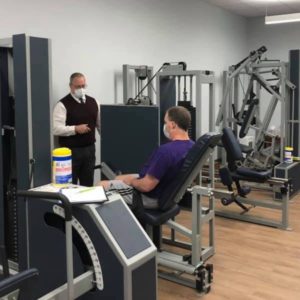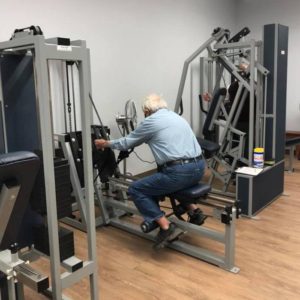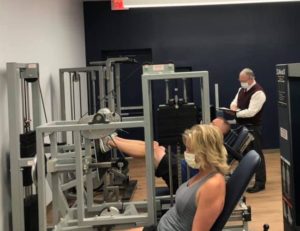Does Strength Training Boost Your Immune System?
A healthy immune system is quickly becoming a more popular fitness goal than six-pack abs. If your immune system is healthy, fighting COVID-19 seems to be a fairly normal task. But, if your immune system is compromised, you could end up in the fight of your life.
 There are a lot of things you can do to improve your immune response. Exercise is one of those things. At Exercise Inc our focus is getting you stronger, but how can that strength help when you are battling a virus?
There are a lot of things you can do to improve your immune response. Exercise is one of those things. At Exercise Inc our focus is getting you stronger, but how can that strength help when you are battling a virus?
If you strength train, as you get older, your muscles will stay strong and intact longer. Being stronger makes everything easier, including thinking. But even more, your immune system receives a serious boost from exercise, making your ability to fight infection and disease at the age of 80 the same as someone half, or even a quarter, of your age.
Inflammation
Inflammation is a process by which your white blood cells protect you from infection. Without inflammation, wounds would fester, and infections could become deadly.
However, if your inflammatory process overreacts or goes on for too long, it can be a problem. Chronic systemic inflammation is the result of an overactive immune system, which produces too many pro-inflammatory cytokines. Cytokines are small proteins secreted by your immune cells that regulate a wide range of functions in your immune system. A healthy immune system has a good balance of pro-inflammatory and anti-inflammatory cytokines. An imbalance of pro-inflammatory cytokines has been linked to heart disease or stroke, and may also lead to autoimmune disorders, such as rheumatoid arthritis and lupus.
Keeping systemic inflammation in check is critical in regard to COVID-19. Researchers are proposing that death from the SARS-CoV-2 is from a mechanism that causes a massive release of pro-inflammatory cytokines, or a cytokine storm, leading to acute respiratory distress syndrome.
Acute respiratory distress syndrome (ARDS) is a life-threatening lung injury that allows fluid to leak into the lungs. Breathing becomes difficult and oxygen cannot get into the body. All patients with ARDS require oxygen, and many require ventilator therapy.
According to a study from the University of Minnesota, controlling the body’s robust inflammatory response to SARS-CoV-2 will likely be as important as antiviral therapies or a potential vaccine. Cytokines cause inflammation in response to infection. Rather than blocking cytokines, medical staff could turn off virus-induced inflammation by broadly activating the body’s natural inflammation-clearing activities.
Strength Training and Inflammation
 Resistance exercise has been shown to prevent degenerative processes and inflammation associated with ageing. A study of thirty-five sedentary, post-menopausal women, who did strength training twice a week for 16 weeks, showed a decrease in systemic inflammation. The women in the study showed a significant decrease in pro-inflammatory cytokines, and a significant increase in red blood cell count.
Resistance exercise has been shown to prevent degenerative processes and inflammation associated with ageing. A study of thirty-five sedentary, post-menopausal women, who did strength training twice a week for 16 weeks, showed a decrease in systemic inflammation. The women in the study showed a significant decrease in pro-inflammatory cytokines, and a significant increase in red blood cell count.
Also, the women in the study were all selected because they had some sort of cognitive impairment. Cognitive scores improved for all the women as well. It seems that a decrease in pro-inflammatory cytokines is good for your brain. Oh, one last thing, all the women in the study got stronger.
A metanalysis on the effects of resistance training on the inflammatory response found that strength training is effective at reducing systemic inflammation and delaying low-grade systemic inflammatory related diseases. The metanalysis examined six studies conducted on the long-term effects of strength training on inflammation and immunity. The studies indicated that intensity plays a role in cytokine responses where higher intensity strength training appears to have a more favorable response. The studies also indicated that a longer rest period between exercise sessions allowed for a more favorable cytokine response. So, train harder and take more days off between workouts.
Diabetes and Obesity
Strength training allows you to increase muscle mass, which increases your resting metabolic rate, making it easier for you to maintain a healthy body weight. That’s important because obesity itself increases inflammation, particularly pro-inflammatory cytokines. A recent study found obesity as a risk factor in COVID-19 hospital admissions for people under 60. Being obese actually doubled the risk of hospital admission for COVID-19 in this lower risk age group. The increase in muscle mass also has a positive impact on insulin sensitivity. This reduces C-reactive protein, which again reduces inflammation and improves immune response.
Stress
 Psychological stress can also impair your immune system and lead to an increase in cold and flu infections. Researchers at Ohio State followed people who had the stress of caring for a loved one with Alzheimer’s disease and found that they experienced twice as many colds as non-caregivers. Psychological stress can increase systemic inflammation about as much as anything. One of the best things you can do to relieve psychological stress is strength training. The feeling after an intense strength training session is a euphoria that will stay with you for a long time. If you’re feeling down, go work out. You will feel better.
Psychological stress can also impair your immune system and lead to an increase in cold and flu infections. Researchers at Ohio State followed people who had the stress of caring for a loved one with Alzheimer’s disease and found that they experienced twice as many colds as non-caregivers. Psychological stress can increase systemic inflammation about as much as anything. One of the best things you can do to relieve psychological stress is strength training. The feeling after an intense strength training session is a euphoria that will stay with you for a long time. If you’re feeling down, go work out. You will feel better.
We Are Here for You
This has been a rough time in our nation’s history. Now more than ever it’s important to stay strong and healthy. Our coaches are here to help you do that. We’ve gone to great lengths to make Exercise Inc a safe, supportive environment for our clients. Even if you haven’t been back in yet, please give us a call. We’ve also started a great Virtual Training Program if you’re still anxious about getting out. Check out what Denny Smith has to say about the program.
Stay Strong and Healthy,
Bo Railey

